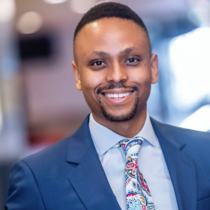Lusanele Magwa
Nationality: South African
Age: 34
Job title: investment specialist at asset management company Robeco
Previous studies: bachelor of commerce honours in economics at Rhodes University, South Africa

1. Why did you choose to go back to school for an MBA?
“You can pick a specialised programme, such as a CFA in my industry, or something broader. I chose an MBA because I wanted to learn how to deal with strategy, widen my network, and obtain a more multi-faceted view of how organisations are structured and how they operate. I had RSM on my radar because of its reputation and location, and several colleagues graduated from here, too. I also wanted an immersive experience, as I learn the most from conversations with people.”
2. How is the Executive MBA preparing you to do business in a world in motion?
“The dynamic curriculum forces you to be flexible, make quick decisions and move to something new. In our complex and ambiguous world, you also need to be flexible and open-minded about developments. We learn to work effectively in diverse teams with people from different industries and walks of life, and find common ground on various topics. You learn to put on different hats and think more critically about issues to solve them.”
3. How would you describe your RSM MBA experience so far?
“Balance has been elusive, so prioritisation is important to function well. The experience has also been character-building, and I have picked up a personal lesson: letting go of control. I made the right decision to embark on this journey – I’m learning so much from faculty members, my classmates, and the case studies. You grow as a person. I see a tangible development in myself. The immediate pay-off is personal development, which is most important."
4. What impact does the Personal Leadership Development (PLD) component of the programme have on you?
“The Personal Leadership Development (PLD) programme is the highlight and the biggest challenge too. I’m intrigued by human psychology. I don’t think other schools offer something like this. It’s about digging deep into yourself as a person to unlock how you operate as a leader in an organisation. It helps shape the context of leadership, and how you affect and interact with people and the environment around you. Talking about your life journey requires you to be vulnerable which can be confronting. But you get important insights from it as you explore risks, strengths and weaknesses. You just don’t realise some things about yourself until you start writing about it. It helps to navigate life better.”
5. How have you applied your new knowledge and skills in your current role?
“The curriculum is really practical. You can easily translate it into the work context. We talk a lot about strategy, leadership and organisational culture. You can use new perspectives to add value to your organisation. For example, I used these learnings to help shape our team strategy to achieve our goals and objectives. You learn about areas you didn’t think about before, discuss them in class and delve into the details with peers. Overall, you assume your authentic leadership style. Being in a class with people from different backgrounds also forces you to learn to deal with diversity first-hand. I work in the finance industry, but I’m learning to bring a different angle to discussions, no matter if it’s about finance or commercial aspects I picked up in the marketing course. This brings rigour to discussions.”
6. How are you contributing to the Sustainable Development Goals through business?
“My company focuses on sustainable investing. We walk the talk by framing investments in terms of how companies contribute to the SDGs, and engaging with clients to achieve their sustainability goals. In the future, I can see myself living out my I WILL statement to empower people to create their own paths. I’d like to create a ‘mentorship platform’ to connect South African expats with young compatriots back home to help expand their horizons. I want to share knowledge and experiences to reduce inequality (SDG10) and stimulate economic growth (SDG8). I also want to help people back home to have access to therapy and services like that. There’s a need for this, and I want to contribute to people’s well-being (SDG3) so they can unlock their potential.”
7. What does the future hold for you?
“I don’t have a defined path, but on this MBA journey, I’ve had an epiphany about how I define success. I want to explore and better leverage my creativity to think outside of the box, problem-solve and add value. I’ve always relied on intuition to guide me. Now that I have a better idea of what ‘success’ means for me, I’ll look for opportunities to achieve this. It could be by bringing new ideas into my current role to help my team and organisation move forward. Or beyond that, I can think about how I can use my creativity to make an impact on the world, maybe with an entrepreneurial venture. One thing is for sure: I’m excited about the future. I have a better understanding of my capacities and what motivates me. I can’t wait to see what happens – in Europe or back in South Africa.”